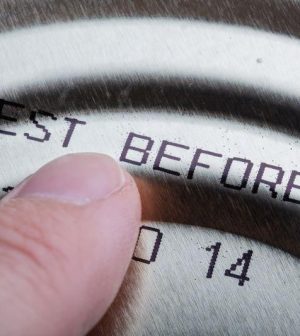- Recognizing the Signs of Hypothyroidism
- 10 Strategies to Overcome Insomnia
- Could Artificial Sweeteners Be Aging the Brain Faster?
- Techniques for Soothing Your Nervous System
- Does the Water in Your House Smell Funny? Here’s Why
- Can a Daily Dose of Apple Cider Vinegar Actually Aid Weight Loss?
- 6 Health Beverages That Can Actually Spike Your Blood Sugar
- Treatment Options for Social Anxiety Disorder
- Understanding the Connection Between Anxiety and Depression
- How Daily Prunes Can Influence Cholesterol and Inflammation
Many Consumers Misunderstand Those ‘Best Before’ Food Labels

People may think they know what ‘Best before’ food date labels mean, but a new study reveals that many consumers misunderstand them.
The study of over 2,600 U.S. adults “showed that an overwhelming majority of consumers say that they use food date labels to make decisions about food and say they know what the labels mean,” said study author Catherine Turvey,. She’s from the department of exercise and nutrition sciences at George Washington University’s Milken Institute School of Public Health, in Washington, D.C.
However, “despite confidently using date labels, many consumers misinterpreted the labels and continued to misunderstand even after reading educational messaging that explained the labels’ meaning,” Turvey said.
Only about 46% knew that “BEST If Used By” meant that food quality may deteriorate after that date, and only about 24% knew that “USE By” meant that food is unsafe to eat after that date.
The researchers also explored whether reframing the messages in other ways would help. They used “value” framing approaches, such as focusing on saving money and avoiding waste. None of the messages were more effective, but they all did increased a general understanding of the labels.
However, after viewing the educational messages, 48% still did not understand the “USE By” label and 37% still did not understand the “BEST If Used By” label, the investigators found.
The findings were published May 6 in the Journal of Nutrition Education and Behavior.
“Responses to the survey suggest that date labels are so familiar that some consumers believe they are boring, self-explanatory or common sense, despite misunderstanding the labels,” Turvey said in a journal news release.
“Unwarranted confidence and the familiarity of date labels may make consumers less attentive to educational messaging that explains the food industry’s labeling system,” she added.
Educating consumers about the meaning of the labels has growing implications for food waste and food safety as the 2-date labeling system becomes more widely adopted and gains more support, the researchers said.
More information
The U.S. Food and Drug Administration has more about food date labels.
SOURCE: Journal of Nutrition Education and Behavior, news release, May 6, 2021
Source: HealthDay
Copyright © 2026 HealthDay. All rights reserved.










